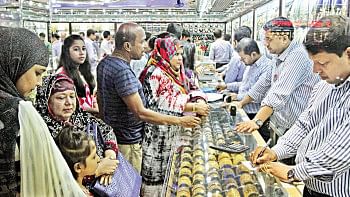Women in Tech: A competition for future women entrepreneurs

Huawei announced the winners of its 'Women in Tech' competition in June 2024, which focused on training potential women entrepreneurs. Here is a look at the competition's journey thus far and what the champion team's project was.
The journey of Women in Tech
In June 2023, Huawei launched its flagship CSR programme, Women in Tech, in Bangladesh, offering students, professionals, and job seekers the opportunity to showcase their talents and innovation. Through a series of screening processes, the field was narrowed down from a pool of 750 participants to the top 50, who were then subjected to further interviews and evaluations. By the end of this phase, 20 participants were chosen to advance to the incubation camp.
The 20 finalists were divided into four teams, each tasked with creating two projects, culminating in a total of eight solutions. In April 2024, the teams presented their final pitch decks, showcasing their work to a panel of judges. The entries were evaluated on their innovative use of ICT solutions and business potential, with judges considering the problem statements, innovation, business cases, and assignment scores.
Among them, the top 3 business ideas were selected in the end. The competition also included individual assessments, recognising participants for their contributions. Four individuals were singled out for their excellence: Kaisari Ferdous from Dhaka University, Mahmuda Nayem and Safrina Kabir from the Islamic University of Technology (IUT), and Sumaiya Tarique Labiba, a design verification engineer at sBIT Limited. These top performers will be awarded the opportunity to attend a startup summit in China.
The project called 'Dhaara' was crowned as the champion, a project focused on using solar energy and other technologies to ensure a safe water supply for households. The first runner-up, 'Terra Bin,' proposed turning waste into resources using solar composters and other technologies. 'Solnet' was the second runner-up, presenting an efficient way to build and operate solar plants using cloud technology and apps. The champion, runner-up, and second runner-up received BDT 3 lakh, BDT 2 lakh, and BDT 1 lakh, as prize money, respectively.
The project of the winning team: 'Dhaara'
In a recent interview with The Daily Star, the team called 'EmPower' shared their project idea. According to them, to address one of Bangladesh's public health crises, they have introduced 'Dhaara', a solar-powered water filtration system designed to deliver safe, affordable, and sustainable drinking water to people. The initiative aims to combat the widespread issue of water contamination, which has left 80% of private water taps contaminated with E. coli bacteria, according to a 2018 World Bank report.
In 2022, Bangladesh's Environmental Performance Index (EPI) score of 26.90 out of 100 highlighted the urgency of the situation, said the team. The 'Dhaara' system is committed to improving access to clean water by providing a reliable, eco-friendly alternative to current water sources. Powered by solar energy, this solution not only reduces the dependency on grid electricity but also promises to cut energy costs for consumers, as per the team.
The 'Dhaara' system will be initially targeted at residential apartment buildings in urban and suburban areas, particularly focusing on the upper and upper-middle income classes. The filtration system, which includes a solar-powered filtration and water storage unit, is designed to meet the daily drinking water needs of a typical seven-story building with 80-100 residents.
According to reports, Bangladesh's water purifier market is expected to reach $157.9 million by 2028, which the team hopes will provide an opportunity for 'Dhaara' to make an impact. According to them, RO/UV filter consumers spend BDT 16,890 a year, and classic filter consumers spend BDT 8,200 a year, while solar filtration costs consumers only BDT 4,800 a year - making it more cost-effective for users. The team hopes that with the support of government policies encouraging the use of renewable energy, 'Dhaara' could help Bangladesh enable a broader push towards sustainable development.
The business model for 'Dhaara' is a hybrid B2B and B2C approach, targeting both developers and building owners, with potential partnerships with developer brands. The system's affordability, coupled with the low-maintenance and customer service options promises a smooth experience for users, says Team 'EmPower'. According to the team, their mission is clear: to ensure that every sip of water is pure, while promoting sustainable energy use in building a greener, cleaner Bangladesh.


 For all latest news, follow The Daily Star's Google News channel.
For all latest news, follow The Daily Star's Google News channel. 



Comments